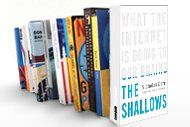
Nicholas Carr
256 pages | Buy this book
Is the Internet the greatest technological gift to humankind since the invention of the printing press? Or is it rewiring our brains, turning us into distraction-prone, screen-addicted infovores incapable of deep, imaginative thought? Author Nicholas Carr probes the latest neuroscience research to make a convincing case for the latter. Unless we want to become a nation of frenzied Ritalin addicts, we need to come to grips with how our iPhones and Twitter accounts are deforming the way we think.
What's the Big Deal?
The Shallows is an expansion of Carr's 2008 cover essay in The Atlantic, "Is Google Making Us Stupid?" The original article was cursed by everyone who thinks big thoughts about the Internet, in part because it was light on science. This is Carr's attempt to definitively prove that Marshall McLuhan is right: the medium is the message, and it's hollowing out our brains.
Buzz Rating: Rumble.
The Internet gave the geeks a platform; The Shallows gave them a reason to use it. Technology types feel almost parentally protective of the Web, and in their mind Carr's argument deserves a hasty, heated rebuttal. Discover magazine proved to be a typical Carr detractor when it claimed "it's hard not to see The Shallows as little more than the latest in a millennia-long line of nostalgia-driven scares brought on by technological revolutions." Carr has plenty of fans, too. In Slate, Michael Agger calls The Shallows "a Silent Spring for the literary mind." Everyone seems to have an opinion about Carr's thesis, and they're standing ready to tweet, blog, post, or buzz about it.
One-Breath Author Bio
A longtime journalist and author, Carr most recently wrote The Big Switch: Rewiring the World, From Edison to Google. He was formerly the executive editor of the Harvard Business Review.
The Book, in His Words
"When we go online, we enter an environment that promotes cursory reading, hurried and distracted thinking, and superficial learning. It's possible to think deeply while surfing the Net, just as it's possible to think shallowly while reading a book, but that's not the type of thinking the technology encourages and rewards" (pages 115–116).
Don't Miss These Bits:
1. The Web is literally rewiring our brains. The brain is plastic, constantly forming and re-forming neural pathways—that's how new skills become familiar ones. A psychiatry professor at UCLA asked a group of Web novices to browse online for an hour a day, for five days. At the end of the trial, "new scans revealed that the area in their prefrontal cortex that had been largely dormant now showed extensive activity—just like the activity in the brains of the veteran surfers" (121). In virtually no time at all, the Internet had permanently set up shop in their heads.
2. Google wants to replace your memory. "Certainly if you had all the world's information directly attached to your brain, or an artificial brain that was smarter than your brain, you'd be better off," Google cofounder Larry Page said in a 2004 interview (172). But giving up brain memory for the silicon kind is an unfair trade, says Carr. "Biological memory is in a perpetual state of renewal," he writes, and each time we access a memory, we change, and re-contextualize it (191). "The memory stored in a computer, by contrast, takes the form of distinct and static bits; you can move the bits from one storage drive to another as many times as you like, and they will always remain precisely as they were" (191). Biological memory fosters creativity, while silicon memory dulls it.
3. You're wired, and you're a jerk. One of Carr's final thoughts is perhaps his most chilling: that the distracted, frenzied pace of the Web is stilting our ability to empathize with others. Brain studies show that we react quickly to physical suffering in others, but it takes more time to register psychological suffering. "The more distracted we become," Carr summarizes, "the less able we are to experience the subtlest, most distinctively human forms of empathy, compassion, and other emotions" (221). Google might not just be making us stupid, but mean, too.
Swipe This Critique
Carr comes across as a Luddite at times, especially when the former English grad student rapturously romanticizes libraries, books, and the act of reading. "The bond between book reader and book writer has always been a tightly symbiotic one, a means of intellectual and artistic cross-fertilization" (74). Gush, gush. The bigger critique, however, is that he goes to great lengths to prove the Internet is changing how we think, but he loses steam in convincing us these changes are actually all that bad. Our brain activity looks different after Internet use. Inarguable, fine. But is it really so terrible that we're more often "snacking" on snippets of relevant text, rather than reading books straight through? That's still in the realm of opinion, not fact.
Gradebook
Prose: Carr is a great writer, but dependent as he is on neuroscience research in this book, it can bog down at times. Try this sentence on for size: "The serotonin released by the interneuron binds to a receptor on the membrane of the presynaptic neuron . . . " It goes on from there, but I'll spare you.
Construction: For a book about distraction, it's a fittingly slight tome, weighing in at just over 200 pages. And Carr smartly intersperses a bit of personality—like his own travails in overcoming Internet addiction to write the book—to lighten the mood after a heavy dose of neuroscience.
Bottom Line: This is a must-read for any desk jockey concerned about the Web's deleterious effects on the mind.
Uncommon Knowledge
Newsweek is committed to challenging conventional wisdom and finding connections in the search for common ground.
Newsweek is committed to challenging conventional wisdom and finding connections in the search for common ground.





